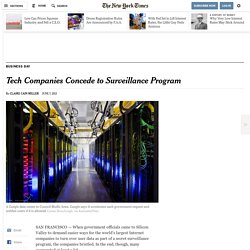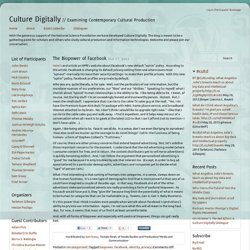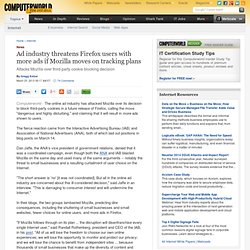

Microsoft's new Terms of Use: "You should not expect any level of privacy" : gaming. Tech Companies Concede to Surveillance Program. Photo SAN FRANCISCO — When government officials came to Silicon Valley to demand easier ways for the world’s largest Internet companies to turn over user data as part of a secret surveillance program, the companies bristled.

In the end, though, many cooperated at least a bit. declined to make it easier for the government. But other companies were more compliant, according to people briefed on the negotiations. They opened discussions with national security officials about developing technical methods to more efficiently and securely share the personal data of foreign users in response to lawful government requests. The negotiations shed a light on how Internet companies, increasingly at the center of people’s personal lives, interact with the spy agencies that look to their vast trove of information — e-mails, videos, online chats, photos and search queries — for intelligence. The negotiations have continued in recent months, as Martin E. Internet & oppression. Why study the Internet and Oppression? Studying the Internet and Oppression appears to be a multi-faceted task.
On one hand the Internet can be an independent tool for the oppressed to speak out from behind censorship and control but on the other hand it can be used by the oppressor to fabricate Internet web sites that entrap and identify those trying to avoid control. How can external views assist with internal oppression? Western societies, with freedom of speech and democratic rights, create many websites and weblogs (blogs) focusing on oppression of the Internet in countries such as China, Cuba, Russia and Syria. Myketiak cites one aspect of Buchanan’s definition of democracy as “a modicum of institutionally secured freedom of speech, association and assembly required for reasonably free deliberation about political decisions and for the formation and functioning of political parties” (2011, p.35).
Is Internet Censorship the only oppressive Internet control? References Like this: The Biopower of Facebook. Here’s and article on NPR’s website about Facebook’s new default “opt-in” policy.

According to the article, Facebook is changing its default privacy setting from one where users must “opt-out”–manually increase their security settings– to make their profile private. With this new “opt-in” policy, Facebook profiles are private by default. Who you are, quite literally, is for sale. Well, not the particulars of our information, but the mundane nuances of our preferences, our “likes” and our “dislikes.” Speaking for myself, what I cherish about “typical” human relationships is the ability to lie. Again, I like being able to lie. Of course, there are other privacy concerns that extend beyond advertising. What I find interesting is that sorting of humans into categories, in a sense, clamps down on that human fuzziness. Assange: 'A mobile phone is a monitoring device' Ad industry threatens Firefox users with more ads if Mozilla moves on tracking plans.
News March 25, 2013 06:17 AM ET Computerworld - The online ad industry has attacked Mozilla over its decision to block third-party cookies in a future release of Firefox, calling the move "dangerous and highly disturbing," and claiming that it will result in more ads shown to users.

The fierce reaction came from the Interactive Advertising Bureau (IAB) and Association of National Advertisers (ANA), both of which laid out positions in blog posts on March 14. Dan Jaffe, the ANA's vice president of government relations, denied that it was a coordinated campaign, even though both the ANA and IAB blasted Mozilla on the same day and used many of the same arguments -- notably the threat to small businesses and a resulting curtailment of user choice on the Internet. "The short answer is 'no' [it was not coordinated]. "If Mozilla follows through on its plan ... the disruption will disenfranchise every single Internet user," said Randall Rothenberg, president and CEO of the IAB, in his post.
Digital Suicide and the Biopolitics of Leaving Facebook - Tero Karppi. Issue No. 20 2011 — Slow Media Digital Suicide and the Biopolitics of Leaving Facebook By Tero Karppi “Everyone now wants to know how to remove themselves from social networks.

It has become absolutely clear that our relationships to others are mere points in the aggregation of marketing data. Political campaigns, the sale of commodities, the promotion of entertainment – this is the outcome of our expression of likes and affinities.” This article approaches the problem of leaving Facebook focusing especially on two art projects Seppukoo.com and Web 2.0 Suicidemachine, both established in 2009 and both offering digital suicide from Facebook as an outcome.[1] These artworks are understood not as representational identities, but rather as nonhuman actors with both incorporeal and material capabilities to affect and be affected, create sensations and be sensed, to set into different kinds of relations with other forces and their capabilities (Parikka, “Ethologies” 116).
Ulises A.